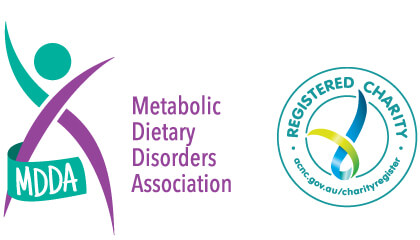
Advocacy is a core element of the work MDDA does. Advocacy can be defined as speaking, acting or writing on behalf of the interest of disadvantaged individuals or group.
MDDA advocate to ensure that all individuals with an inborn error of metabolism (IEM) are able to: have their voice heard on issues that are important to them, have their views and wishes considered when decisions are being made about their treatments, management and care.
As the National Peak Body we play a unique role, representing the entire IEM community to the wider community, interested industry sectors, other organisations and the Australian Government. We represent the interest of all people affected by IEMS by advocating and lobbying the Australian Government for better standards of care and on other issues of national concern.
MDDA assists the Government to inform and support the health agenda by improving linkages, networks and cooperation with our members and the health sector. We have established effective relationships with the Australian Government, its departments, other health and private national bodies, to advocate on issues relating to IEM health care policy and programs in the following ways:
- Represent the needs of people with an IEM dietary condition and their families with governments and other organisations.
- Consult with health professionals to influence improved care and clinical resources for IEMs.
- Promote and encourage individuals to self-advocate in matters related to their IEM health care.
- Liaise with medical food suppliers within Australia to ensure variety and continuity of specialised IEM food options.
Raising Awareness
MDDA devotes a significant amount of our time raising awareness of IEMS, as it is important for IEMs to be understood by the whole community, not just those affected by IEMs.
Formal Submissions
Submissions are a key tool and a strong part of the foundation for MDDA’s advocacy work. Governments, Commissions, regularity bodies and other peak bodies seek input to their decision-making processes by calling for comment and/or recommendations from external parties via formal submissions. Submissions provide an opportunity MDDA to be:
- Responsive to key priorities of government.
- A window of opportunity to influence structural change and reform.
- An opportunity to articulate and formalise the views of the MDDA and our community.
- Help to identify key stakeholders and allies with whom to coordinate with and mobilise.
Advocating to the Australian Parliament
We work with all political parties to advocate for the appropriate support and resourcing to bring about positive change. We act in the interest of our members at all times. We do not shy away from telling decision-makers what they need to hear. We may have strong positions, but we advocate in a constructive respectful manner. Our advocacy messages and approaches build on our strategies, plans and policies.
- Write letters alerting them of an issue.
- Request meetings to discuss an issue.
- Develop briefs for them to understand an issue.
Advocacy Initiatives and Priorities
We draw on many sources to inform advocacy priorities, including but not limited to:
- Open consultation with our membership – we are always listening to the concerns and suggestions of our members.
- Formal and informal consultation for policy submissions.
- Membership surveys
- Feedback during forums, AGMs and events.
- Discussions in networks and special interest groups.
- Collaborations with our strategic partners.
THE DIFFERENCE WE MAKE
- Low-Protein Milk to Remain on the PBS: A Win for Our Community
- BREAKING NEWS: The Power of Advocacy a win for equitable treatment for the PKU Community
- Launching Make Some Noise of PKU!
- Advocacy in Canberra
We welcome anyone to join our advocacy team and together we can advocate to ensure a better future for all IEMS. If you would you like to contribute in a more hands on role to support MDDA’s Advocacy efforts please email [email protected].
